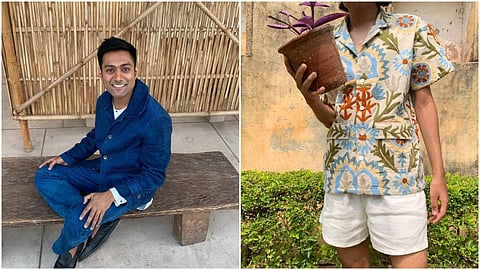
- LIFESTYLE
- FASHION
- FOOD
- ENTERTAINMENT
- EVENTS
- CULTURE
- VIDEOS
- WEB STORIES
- GALLERIES
- GADGETS
- CAR & BIKE
- SOCIETY
- TRAVEL
- NORTH EAST
- INDULGE CONNECT

“What is the point of making clothes if you don’t know who the buyer will be?” asks HARAGO’s Harsh Agarwal. The Jaipur-based label relies on made-to-order production, and prioritises legacies - personal and artisanal - in a really creative way. HARAGO’s approach to upcycling has been anchored by Agarwal’s mum and grandmum, who influenced the menswear label’s design ethos (the label's Kavita Cross Stitch Set, for instance, has been made from a bedroom set hand-embroidered by Agarwal's mum in 1985)
“My nani and mom are textile hoarders and have been filling trunks with textiles including fabrics, sarees, table-linens etc. One day my nani shared the story behind each piece of textile, when and why she had bought it, why she still kept it close. They gave me a perspective on how to look at these textiles and many ideas started brewing. We thought of collecting our vintage textiles pieces, even from friends and families, if they were willing to give them up. In our SS/FW21 collection we’ve used a lot of handwoven textiles, embroideries inspired from 1970’s and 1980’s vintage textiles, mended and repaired deadstock fabrics to give them a longer lease of life,” Agarwal shares. In an interview, Agarwal further breaks down Harago’s production routes:
Tell us a little about Harago's production process. Is everything made-to-order?
We prefer to take the orders first and then schedule small-scale production. This allows us to go for quality construction and ensure longevity of a garment. Everything is made on demand, it’s ideal for sustainable production. We can eliminate the waste and ultimately we are not creating stock that will have the probability of not being sold.
We believe in paying fair wages to the tailors instead of mass-producing, or undermining the quality check and then later having to sell them at a marked down price, benefiting neither the craftspeople nor the business. All the fabrics are sourced directly from the artisans. We discover the artisans through our travels, we meet them one-to-one, hear their story and collaborate with them.
Tell us about the idea behind the label
The brand embodies the narratives of cultural craftsmanship and use of historical textile techniques. Harago does not follow fashion trends, the pieces are not defined by seasons and select ones can be re-ordered.
We don’t call Harago a ‘sustainable fashion’ label, in fact the fashion industry in itself can never be sustainable. There are so many new ideas and inspirations, which take up a lot of resources. We are striving to be as responsible and accountable as possible. As a brand, we care about historical methods and traditional textile making techniques (antique cross stitching is one of our core signature embroideries along with twill denim weaves and tie-dyeing of yarns).
Can you elaborate on your approach to upcycling?
We use upcycling in various ways like sourcing deadstock fabrics and converting them into garments made, mending and repairing the vintage / deadstock textiles, reusing leftover fabrics and reusing all the fabric scraps after the cutting to make tote bags/pouches. It is the little things that count for us, for example we make buttons out of fabric-cutouts and use only hand-woven fabrics thus allowing weavers to remain productive with the age-old skills.
What is the most significant challenge when it comes to running an artisanal, slow fashion label?
Meeting the deadlines of handloom fabric production for bulk order deliveries right in time for a season-based collection, convincing customers that it’s okay for natural indigo to bleed or rub off etc.